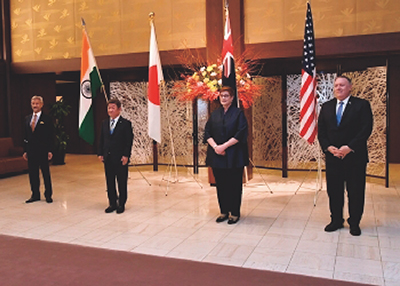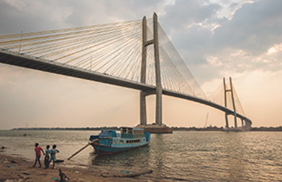ODA Topics 2
Promoting Initiatives for the Realization of a “Free and Open Indo-Pacific”

Foreign Minister Motegi attending the second Japan-Australia-India-U.S. Foreign Ministers’ Meeting (October 6, 2020)

Tsubasa Bridge constructed with Japanese assistance (Photo: KUNO Shinichi/JICA)
The concept of a “Free and Open Indo-Pacific (FOIP),” advocated by Japan in 2016, is becoming widely shared not only by the United States but also by Australia, India, ASEAN member states, and European countries.
On Prime Minister Suga’s visit to Viet Nam and Indonesia in October 2020, the leaders exchanged views regarding coordination between the “ASEAN Outlook on the Indo-Pacific (AOIP)” and FOIP. At the Japan-ASEAN Summit Meeting held in the following month, the “Joint Statement of the ASEAN-Japan Summit on Cooperation on ASEAN Outlook on the Indo-Pacific” was issued, confirming that the AOIP and FOIP share fundamental principles. The statement declares that cooperation will be enhanced in line with the priority areas of the AOIP, namely, maritime cooperation, connectivity, the SDGs, and economic and other possible areas of cooperation. The importance of FOIP and full support for the AOIP were reaffirmed at the Japan-Australia-India-U.S. Foreign Ministers’ Meeting held in Tokyo in October 2020. During his visit to African countries in December 2020, Foreign Minister Motegi and his counterparts of each country shared the view that they would cooperate toward the realization of FOIP. Japan will continue to work closely with various partners to strengthen the multi-layered cooperative relationship.
The basic approach to realize FOIP is as follows: (i) communicating policy on maritime order and sharing insights on the international law of the sea with the international community; (ii) rule-making to expand a free and fair economic sphere; (iii) achieving connectivity across the Indian Ocean and the Pacific; (iv) enhancing governance through capacity building and other measures; and (v) ensuring maritime security and maritime safety. To this end, Japan will utilize ODA in a strategic manner.
For developing quality infrastructure to promote connectivity across the Indian Ocean and the Pacific Ocean, Japan has been implementing projects that contribute to strengthening connectivity of: the Southern Economic Corridor, which connects megacities such as Ho Chi Minh, Phnom Penh, and Bangkok, known as “Mekong’s aorta,” to the Indian Ocean; and the East-West Economic Corridor, which connects Da Nang in Viet Nam to Laos and inland Thailand and to the Indian Ocean through Myanmar. Specifically, Japan carries out initiatives that help improve the efficiency of logistics and alleviate traffic congestion, such as the construction of Tsubasa Bridge in Cambodia and the improvement of National Road No. 9 in Laos. In addition, Japan supports the construction of a new port in Patimban, West Java Province, Indonesia. In December 2020, a tentative opening ceremony was held to showcase the completion of parts of the facilities after the construction work for areas which are to open ahead of the main site had significantly advanced. Moreover, for enhancing governance through capacity building support and other measures, Japan, for example, dispatches macro-economic policy advisors aiming at strengthening the capacity of partner governments in fiscal policy and public debt management to encourage self-reliant and sustainable growth.
From the perspective of ensuring maritime safety, Japan has been actively providing support for capacity building for maritime law enforcement to countries along Japan’s sea lanes, such as the Philippines and Viet Nam, with the aim of building a free and open international order. Such efforts include providing patrol vessels, coastal monitoring radars, and other equipment, as well as human resources development through the dispatch of experts and trainings. Japan continues to make efforts to ensure peace and stability by eliminating factors such as piracy and terrorism.
The stability and prosperity of Japan and this region cannot be achieved without a “Free and Open Indo-Pacific” that is underpinned by transparent rules and active exchanges of people, goods, and wisdom. Japan will continue to utilize various forms of assistance, including ODA, in making efforts to realize FOIP.
